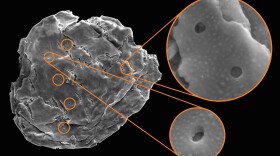Fish and frogs swim slower when they’re exposed to pesticides, according to a review study by two Northern Arizona University biologists.
Molly Shuman-Goodier and Catherine Propper compiled data from dozens of laboratory experiments. They found, on average, fish and amphibians swam 35% slower and were 72% less active after pesticide exposure.
Propper says that result was consistent for almost every kind of chemical tested. “I didn’t think that we would see it across such a wide range of pesticides so consistently, but we did,” she says, “and that leads to some concerns about environmental exposure for organisms.”
Sluggish fish and frogs might have trouble finding food or mates, and can be more vulnerable to predation. Propper points to a need for more research on how small doses of pesticides affect animal behavior and potentially human health.
The study appeared in Science of The Total Environment.







